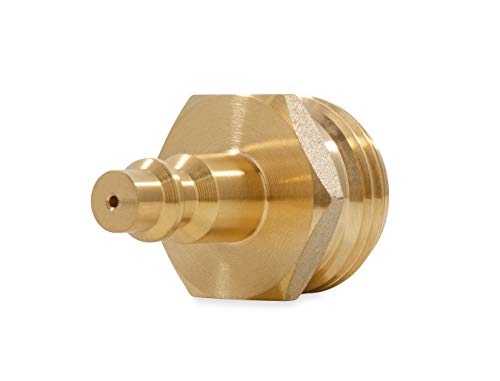
5 or.75 HP air compressor should do that job OK. If there’s convoluted piping, add higher pressure and get the flow of compressed air going into the pipe as fast as you can to build the volume of air inside the pipe quickly, to drive the water out before it. It will help a lot if the hot water tank has been drained first as that’s a lot of water and will take a long time for air from the compressor to blow all that water out. A small compressor that has a tank that holds 2-3 cubic feet of air, one with a regulator to reduce the outflow pressure if need, and an air hose with a high flow blow gun may be all you need for the small line that Phillip has a whole house water system will require a bigger air supply to ensure that compressed air drives all the water out before the air flowing into the water lines.
Whether it’s because you’re ready to winterize your RV or you simply want to flush your water pipes and start fresh, every RV owner should know how to blow out RV water lines properly. Blowing out your water lines while they still contain hot water can result in burns and other damage to the external components of your RV. That’s why we recommend turning off your water heater and allowing any water in your lines to cool for a day before you proceed. Most RV manufacturers recommend setting your air compressor between 30 and 40 PSI to blow out RV water lines.
Blowing out the pipes is how we winterized all the houses that we took. Turn the water pump breaker off, hook a garden hose to the drain fitting. To make sure that you have all the water out of the system.
RV Whisperer is a participant in the Amazon Services LLC Associates Program. Amazon and the Amazon logo are trademarks of Amazon.com, Inc. or its affiliates. As an Amazon Associate, we earn from qualifying purchases.
how to connect air compressor to water line Related Question:
How do I winterize my water lines in my house?
Outdoor Plumbing Winterization Tips Drain water lines. Turn off the water supply to outdoor faucets, and drain any remaining water by opening the taps until they run dry. Dress up faucets. Protect outdoor pipes from freezing temperatures by insulating them with an outdoor faucet sock.
How do I winterize my sprinkler system without a blowout?
Not all systems need to have the water blown out of them. You can winterize a sprinkler system without an air compressor if all of your irrigation lines are buried at a slight downhill slope. Simply shut off the main water supply to your system and open the drain valves at the end of each zone.
Should I drain my pipes to keep them from freezing?
The good news is that you can prevent pipes from freezing in the first place by keeping them warm. If you’re leaving for an extended period of time in the winter, you can and should drain your water lines. On the other hand, if a deep freeze hits your pipes before you can take action, you can thaw them safely.
How do you keep outside water pipes from freezing?
Prevent outdoor pipes from freezing by insulating outdoor hose bibs and water supply lines. Pipe insulation contains a slit that makes it easy to slide over water pipes and supply lines, and bib covers shield the spigot from winter weather.
Do I have to turn off outside water in winter?
The best way to prevent damage to water lines during winter is by turning off outside faucets. Regardless of whether your water lines are freeze proof or not, removing hoses and splitters from the spigot during cold weather can save you from a lot of trouble.
At what temperature should you turn off outside water?
As a general rule of thumb, in order for your home’s water pipes to freeze, the outside temperature needs to be below 20 degrees, for a total of at least six consecutive hours.
What PSI should I blowout my sprinklers?
Air pressure must not exceed 50 pounds per square inch (psi) during the blow out procedure. A pressure-regulating valve must be used to avoid over pressurization of the system. Air volume should be high and air pressure low.
Can I just drain my sprinkler system for winter?
Luckily, you can avoid frozen and burst irrigation pipes. To keep your investment functional, make it an annual habit to winterize your irrigation system. Simply drain the system and shut it down when you’re done watering for the year.
How do you fix air in water pipes?
Turn On Faucets Throughout Your Home It is only necessary to open the faucets a half turn to allow the air in your pipes to escape. After you turn on all the cold and hot water faucets in your house, you should also flush your toilets to clear out the air trapped in your pipes.
How does air get into water pipes?
The main cause of air in the water lines is water system maintenance. Cutting off the water supply for a period of time can allow air to enter the system. (Running faucets briefly usually resolves this problem.) Maintenance work on the water main may also introduce air into your system.
Can air in water pipes cause damage?
Most of the time, the air within your water pipes will not cause significant damage to your plumbing. It is only air, after all. However, trapped air can cause irritating problems such as: Excessive noise coming from your walls.

